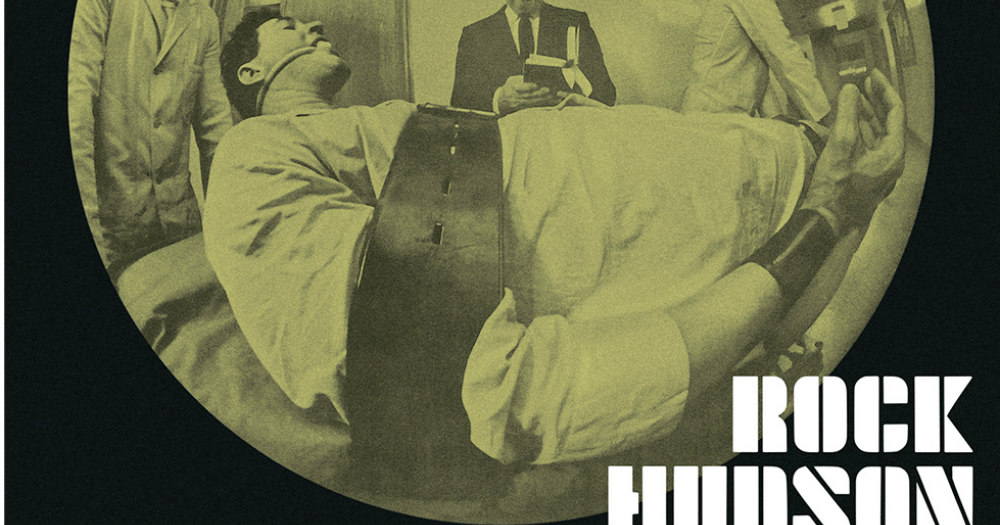
“Why did Rock Hudson star in this movie?” I kept asking myself while watching Seconds for the third or fourth time this past week. By many accounts, the shoot wasn’t a particularly pleasant one, with at least two scenes – the infamous “stomp those grapes!” near-orgy and the drunken party – pushing the star wildly out of his comfort zone. He was slightly past his prime, but still commanding starring roles in mainstream hits. His success with Doris Day meant he was mostly doing comedies, but he still got some dramatic work in here and there (though 1963’s A Gathering of Eagles, the last drama he did before Seconds, was not well-received critically or commercially). And if he did want to push himself dramatically, why a science fiction film about mortality? Hudson not only accepted the part, but actively lobbied for it, winning over director John Frankenheimer, who preferred the more renowned thespians Kirk Douglas and Laurence Olivier. Paramount wanted a star.
Three important things happened to Rock Hudson in 1965, the year before Seconds was released. First, he would turn 40 that November; while still in many ways the very image of masculine virility, he was starting to age. Second, after eight years in the Top Ten Money Making Stars poll, he fell to number 11. Third, after over a decade as Universal’s golden boy, deftly moving between genres for them, keeping pace with the times and tastes of their audience, and rarely making a film anywhere else, his contract was up and went unrenewed. He would make two more films with them over his increasingly-sparse career (1967’s Tobruk and 1973’s Showdown), but he spent the rest of it as a freelancer, doing his most popular work on television.
Keep that in mind when, looking back on Seconds in 1976, he told Films and Filming magazine (quoted in David Bret’s book Rock Hudson: The Gentle Giant):
What I liked was that the story wasn’t really told until the film has been seen. Or in my case, until I’d finished reading the script…For some strange reason it’s only truly told when you think back on it. I mean, that clinic is a death clinic. But as you watch the movie you don’t feel that. You’re thinking of these unfortunate people who can’t grapple with life the way they are. So they change for a better life – for nothing! Meanwhile the clinic’s gotten rich from the assets of the clients – just flat rich. That’s what made it terrifying to me. And equally, that’s what made it intriguing to do!
Here’s a guy who struggled with life the way he was (a closeted gay man), constantly changing himself into the image of something “better” (a straight, sexually desirable journalist/farmer/composer/oil baron, whatever the part required, but always the image of Success), making other people rich off of this desire, and then tossed out like nothing the second his youth was exhausted. And it’s only once it’s all over that you realize what even happened.
I’ve always admired Seconds for what it did with Rock Hudson. This time, I realized how much he did with it. He used the framework of an old man who pays to be killed and reborn to explore how he himself might soon be re-purposed and discarded, and the horror that comes along with it. Hudson himself came into show business with a different name, different teeth, and a different demeanor. Universal (and Hudson’s agent, Henry Wilson) changed all that. The industry he thought he was exploiting was secretly exploiting him, just waiting for the moment when he would reach the end of this fantasy. Studios surround their stars with handlers (in Seconds, a butler always trying to course-correct him) and beautiful women (here in the form of Nora Marcus [Salome Jens], whose sudden appearance out of the blue may not be so coincidental), and enablers of all kinds to gently pacify and imprison him. But one day, it’s not enough. So when Tony Wilson is being wheeled down that hallway at the end, screaming and writhing to break free of the gurney, there’s a sense too in which Hudson the actor is being carted off to make room for the next fresh young thing to take his place. It’s a factory; a death clinic.
Masters of Cinema presents Seconds on Blu-ray in a transfer that looks, for all intents and purposes, identical to the Criterion presentation released a few years back. We get a rich, filmic look, with varying grain, slight flicker, strong contrast, and minimal damage. The scenes at the beach in particular are really exceptional, with all the different textures – sand, grass, clothes, hair, clouds, water – feeling very natural; even the wind seems to have an extra bite to it. MoC keeps the Frankenheimer commentary, originally recorded for the studio DVD release, and adds an even better one by scholar Adrian Martin, who has even more to say on the film’s themes, with a few production insights. He really brings the discussion of the film up to the present day, roping in the finale of Mad Men, which aired earlier last year, a show with many thematic ties to Seconds (as I brought up in the podcast that David, Sean, and I did on the film in the fall of 2014). They also add an interview with critic and novelist Kim Newman. They wrap it up with a booklet with essays by David Cairns and Mike Sutton. On the whole, though I miss Alec Baldwin’s appearance from the Criterion edition, I prefer MoC’s release between the two.



![Bergman Island (The Criterion Collection) [Blu-ray]](https://criterioncast.com/wp-content/uploads/2022/11/bergman-island-the-criterion-collection-blu-ray-400x496.jpg)
![This Is Not a Burial, It’s a Resurrection (The Criterion Collection) [Blu-ray]](https://criterioncast.com/wp-content/uploads/2022/11/this-is-not-a-burial-its-a-resurrection-the-criterion-collection-blu-ray-400x496.jpg)
![Lars von Trier's Europe Trilogy (The Criterion Collection) [The Element of Crime/Epidemic/Europa] [Blu-ray]](https://criterioncast.com/wp-content/uploads/2022/11/lars-von-triers-europe-trilogy-the-criterion-collection-the-element-of-400x496.jpg)
![Imitation of Life (The Criterion Collection) [Blu-ray]](https://criterioncast.com/wp-content/uploads/2022/11/imitation-of-life-the-criterion-collection-blu-ray-400x496.jpg)
![The Adventures of Baron Munchausen (The Criterion Collection) [4K UHD]](https://criterioncast.com/wp-content/uploads/2022/11/the-adventures-of-baron-munchausen-the-criterion-collection-4k-uhd-400x496.jpg)
![Cooley High [Criterion Collection] [Blu-ray] [1975]](https://criterioncast.com/wp-content/uploads/2022/11/cooley-high-criterion-collection-blu-ray-1975-400x496.jpg)